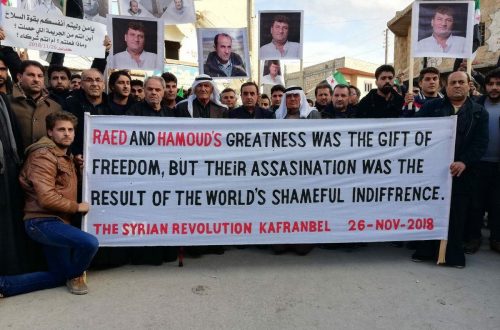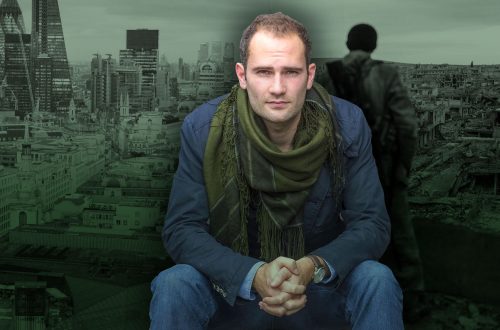Guest post by DaveM
Syrian forces along with Hezbollah, having taken the border town of Qusayr, are now at the outskirts of Aleppo where the rebels, armed with Konkurs anti-tank missiles are preparing for an all out attack.
While Hezbollah fighters appear to be very reluctant to be seen on camera operating with the Syrian army, it’s pretty much a given that they’re fighting alongside Assad’s troops.
The Daily Telegraph’s Richard Spencer is with the rebels in Aleppo while Hezbollah’s TV station Al Manar has reporter Somar Hatim is embedded with the Syrian army on the Southern outskirts of the city.
His report is the typical Syrian regime propaganda, lacking any trace of objectivity, analysis or insight:
In the countryside south of Aleppo the Syrian Army have made headway towards the gunmen’s stronghold in the area of Khanasar.
Storm of the North is the name attributed to Syrian Arab Army’s continuous operation in Aleppo, especially in the southern countryside.
Units of the army, with a variety of its weapons and vehicles, have advanced, attacking the gunmen’s stronghold, the gunmen who are concentrated in the hills overlooking the eastern region of Khanasar.
The units didn’t refrain from targeting the gunmen who have concentrated in the hills overlooking the eastern region of Khanasar and achieved direct hits amongst the ranks of the armed groups.The aim of the gunmen was to cut off the highway between Hama and Aleppo which the Syrian army had taken control of some months ago. However the Syrian Armed Forces’ response was powerful in preventing any attempt to cut off its supplies to Aleppo.
Decisive confrontations are expected in the upcoming days and the Syrian army is insistent in completing the military operations which it began in Aleppo, completing its achievements, which it began, along the entire range of Syria’s map.
From the Southern countryside of Aleppo, Somer Hatim Al Manar.
However if you look behind the propaganda of the regime and its allies such as Hezbollah, the Alawites don’t appear to be quite so confident.
No one in the room would say it, but there was an unspoken sense that they, too, were victims of the regime. After two years of bloody insurrection, Syria’s small Alawite community remains the war’s opaque protagonist, a core of loyalists whose fate is now irrevocably tied to Assad’s.
Alawite officers commanded the regime’s shock troops when the first protests broke out in March 2011 — jailing, torturing and killing demonstrators and setting Syria on a different path from all the other Arab uprisings. Assad’s intelligence apparatus did everything it could to stoke sectarian fears and blunt the protesters’ message of peaceful change.
Yet the past two years have made clear that those fears were not completely unfounded, and it did not take much to provoke them. Syria’s Sunnis and Alawites were at odds for hundreds of years, and the current war has revived the worst of that history. Radical jihadis among the rebels now openly call for the extermination or exile of Syria’s religious minorities. Most outsiders agree that Assad cynically manipulated the fears of his kinsmen for political survival, but few have asked — or had the opportunity to ask — how the Alawites themselves feel about Assad, and what kind of future they imagine now that the Sunni Arab world has effectively declared war on them.
“What is horrible is that everyone is now protecting his existence,” Sayyid Abdullah Nizam, a prominent cleric in Damascus, told me. “For all of the minorities, it is as if we have entered a long corridor with no light.”
They’re also finding their identity and national myths to be increasingly brittle and unable to withstand reality.
If the opposition has lost its meaning, so has the regime. The Assad clan has always defined its Syria as the “beating heart of Arabism,” the bulwark of the Palestinian cause.
The Baath Party was meant to embody this spirit, and Syria’s minorities were eager to prove their loyalty as Arabs in a Muslim-majority society.
This was the glue that would hold together the country’s fractious communities. But now Syria has been formally excommunicated by the Arab League, the reigning pan-Arab institution, and the old unifying ideologies — paid lip service until the crisis began — are openly mocked.
On a quiet side street in one of Damascus’s richest neighborhoods, a prominent lawyer invited me to join him and his friends in an opulent, booklined study. There were soft leather couches and European chocolates on the coffee table. A 16-frame video screen showed every approach to the house. One of the guests was the Rev. Gabriel Daoud, a Syriac Orthodox priest who sprawled on an armchair in his black robe. The subject of Syria’s minorities came up, and Father Daoud’s face registered his irritation. “Minorities — it’s a false name,” he said. “It should be the quality of the people, not the quantity. It gives you the idea that minorities are small and weak. But we are the original people of this country.” As for the protesters and their demands for freedom, Father Daoud smirked: “They don’t want hurriya, they want houriaat.” Hurriya is the Arabic word for “freedom,” and houriaat is the plural of houri, the dark-eyed virgins that suicide bombers are promised in the afterlife.
Daoud spoke bitterly about the kidnapping of two Christian bishops, whose fate was unknown. “They may have Syrian nationality, but not the mentality,” Daoud said of the rebels. “We are proud of our secularism. We cannot live with these barbarians.” When I raised the subject of Arab nationalism, one of the guests in the room winced. “We are Mesopotamian, not Arabic,” he said. “We don’t want to be Arabic.”
It’s worth reading in full.
With the “last castle of Arab dignity” breaking up along sectarian lines, what does the regime do now that its founding ideology of Arab unity has finally been exposed as a sham?
Simple. Keep on killing and blame it all on Africans, Gulf Arabs and Jews:
Facts have come to light regarding the Zionist support for the armed terrorist groups on Syrian land. The latest support has been uncovered by sources from the Algerian newspaper Al Fajr.
The cells called The Jihadist Groups, which aim to recruit Algerian youths to fight alongside terrorist groups in Syria, behind them stands the Israeli Mossad providing them with support, both material and moral, and protection for them in some countries. This, according to Algerian official investigations with members of these cells.
Members of these cells represent different Arab nationalities and they’re using Tunisia as their headquarters after the ruling Nahada movement provided them with protection and cover to carry out the Qatari conspiracy against countries of the Maghreb. And this was what was brought to light by the newspaper.
Noting that these members move amongst the youths who adhere to Salafism, and collect money and material for the terrorists in Syria. Worldwide intelligence and media reports confirm the existence of tens of thousands of foreign mercenaries from over 64 nationalities who are fighting alongside armed terrorist groups in Syria – this according to what the German newspaper De Welt has recently uncovered.
It’s clear that the percentage of Syrians among the terrorist groups is no more than 5 percent while 95 percent (of the terrorists) belong to extremist groups which come from Libya and other African countries, with official support from the Gulf states under the name of Jihad in Syria.
Israeli support for terrorist groups in Syria is nothing new, and there are no doubts about it whatsoever. Especially after the President of the Zionist Entity Shimon Peres recently described the American decision to arm the armed groups in Syria as a wise decision. He made clear his satisfaction that any weaponry which makes its way to these groups will not be used against his entity.
And after the ZIonist recognition, and what’s been revealed via the Arab and Western media – let history comment.
If that doesn’t work then why not broadcast some Glenn Beck?
If all this wasn’t weird enough, Iran has been criticising the calls for jihad in Syria, saying that this will result in radicalism in the region.
The important thing to remember in all this is that Assad has always played the role of arsonist and firefighter. Undoubtedly Al Qaeda is now part of the uprising against him and this is extremely worrying.
But it’s important to remember that for years Assad’s regime sponsored Al Qaeda and facilitated the movement of its fighters into Iraq to kill American soldiers. Just because he’s fighting them now doesn’t guarantee that he won’t reconcile with them some time in the future if he manages to stay in power and crush the uprising. He’s used them in the past, he’ll use them in the future.
He’s the last person on earth anybody should trust in the fight against them.


